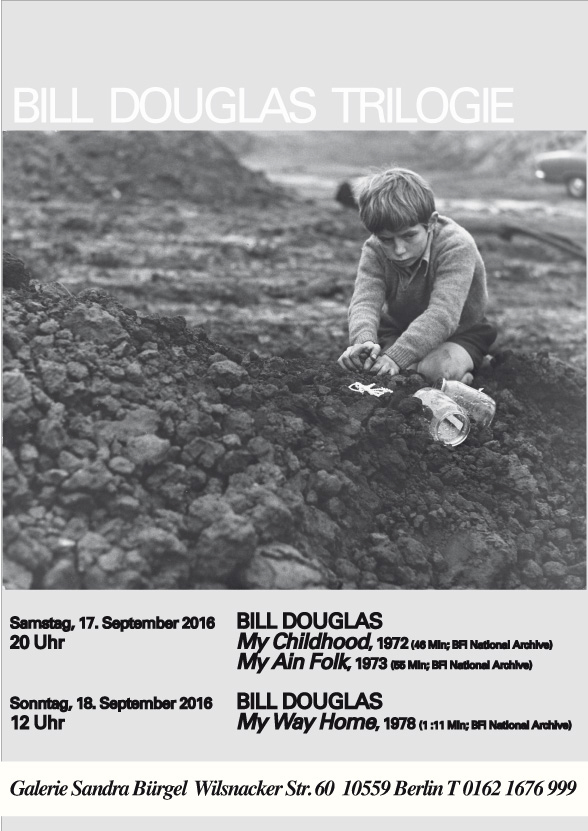The Bill Douglas Trilogy, Sept 17/ Sept 18 (Prologue to „Bürde“)
Bill Douglas "My Childhood" (1972; 46 min) – Saturday, Sept 17, 2016, 8 p.m.
Bill Douglas "My Ain Folk" (1973; 55 min) – Saturday, Sept 17, 2016
Bill Douglas "My Way Home" (1978; 1h 11 min) – Sunday, Sept 18 2016, 12 p.m.
Credits: BFI National Archive
Die Filme „My Childhood“, „My Ain Folk“ und „My Way Home“ von Bill Douglas erzählen die Kindheit und das Heranwachsen von Jamie (Stephen Archibald) im schottischen Bergarbeiterdorf Newcraighall in bettelarmen und haltlosen Verhältnissen, zunächst mit seinem Halbbruder Tommy (Hughie Restorick), bei den Großmüttern, dann alleine im Waisenhaus und schließlich im ägyptischen Wehrdienst, wo sich durch die Bekanntschaft mit Robert (Joseph Blatchley) seine Welt einer anderen weiteren Welt öffnet.
Mit seiner autobiografischen Trilogie hat Bill Douglas (1934 in Newcraighall - 1991) ein bewegendes Dokument über materielle Beugung sowie menschliche Widerstandskraft und eines der eindringlichsten Mahnmale gegen Armut geschaffen. Aus der behutsamen Anwendung von filmischen Mitteln, die ihre umfassende Kenntnis voraussetzt, den Effekt meidet, um der Erzählung zu dienen, formt sich eine leise Erzählweise, welche die größten Kontraste des Lebens klammert. Sie reicht von zarter Komik, vor allem während der Pubertät des Jungen im Waisenhaus bis zur angemessenen schroffsten Darstellung von Gewalt und Hunger. In langen Einstellungen fasst die Kamera die karge Umgebung der Kinder, Landschaft, Gegenstände (Äpfel, Treppen, Züge, Leichenbitter, Betten) - nicht als symbolistische Details sondern als Bilder tief verhafteter Erinnerung. Meisterhaft stößt sie in die Psyche vor und baut sich ihre eigene Zeit; unterstützt wird sie vom präzisen, expressiven Ton sowie der Leistung der Laiendarsteller, die sich über 6 Jahre erstreckte. In der Trilogie findet sich außerdem das wohl erstaunlichste Farb Insert (ein transatlantisches) in einen sozialrealistischen Schwarzweißfilm.
Seine ersten Jahre in London verbringt Bill Douglas in der ‚Theatre Workshop’ Kompagnie von Joan Littlewood. 1968 schreibt er sich an der 'London International Film School' ein. Dort trifft er auf Mamoun Hassan, Produktionsleiter am British Film Institute, der auf der Grundlage des Drehbuchs „Jamie“ (nachher „My Childhood“) die Trilogie unterstützt, und später als Direktor der National Film Finance Corporation mit Douglas ebenso dessen Spielfilm „Comrades“ (1980/1987) realisiert. „Comrades“ beruht auf der Historie der ‚Tolpuddle Martyrer’, sechs Farmern aus Dorset, die 1834 die „Friendly Society of Agricultural Labourers“, Vorläuferin moderner Gewerkschaften, gründeten und nach Australien deportiert wurden. Das Werk von Bill Douglas, das im deutschen als auch amerikanischen Raum nahezu unbekannt ist, umfasst ferner zwei nicht realisierte Drehbücher („Justified Sinner“ & Flying Horse“) und ein posthumes Skript („Ring of Truth“). Aus der von Bill Douglas und Peter Jewell angelegten Sammlung von Objekten und Dokumenten zur Geschichte und Prähistorie des Kinos ist das ‚Bill Douglas Cinema Museum’ an der Universität von Exeter hervorgegangen.
Die Trilogie ist als Prolog der Gruppenausstellung "Bürde", die am 24. September 2016 eröffnet, vorangestellt. Die Filmvorführung wurde von Götz Eichhoff, Berlin, beeinflusst und unterstützt. Wir danken außerdem dem BFI, London.
___
The three films "My Childhood”, “My Ain Folk“ and "My Way Home" of Bill Douglas recount the childhood and growing up of the young boy Jamie (Stephen Archibald) in the Scottish mining village of Newcraighall, in desperately poor circumstances and worsening physical and emotional abandonment, initially with his half brother Tommy (Hughie Restorick) and his grandmothers, followed by orphan asylum and finally Egyptian military service where his world opens up into other worlds by the acquaintance with literate Robert (Joseph Blatchley).
With his autobiographical trilogy Bill Douglas (born in 1934 in Newcraighall - died in 1991) has created a poignant document on material constraints as well as human resistibility, and one of the most urgent memorials against impoverishment. From the careful use of cinematic means - which implies its profound knowledge and avoids any effect not serving the story - develops a quiet, gentle narrative able to cotter the biggest contrasts of Life. It ranges from delicate comedy, particularly during adolescence in the orphanage, to the suitably harshest depiction of violence and hunger. The camera conceives the sparse surroundings of the children in long settings, landscape and objects (apples, stairs, trains, funeral bidders, beds) rather as pictures of deep-seated recollections than symbolist details. It ventures into the psyche and founds its own time, and is supported by precise, expressive sound as well as the achievement of the amateur actors that is spanning more than 6 years. Moreover, the trilogy contains the probably most astonishing (transatalantic) insert of colour into a black-and-white movie of social realism.
Bill Douglas spends his first years in London in the ‘Theatre Workshop’ company of Joan Littlewood. In 1968 he enrolls at the London International Film School where he meets Mamoun Hassan, head of Production at the British Film Institute. On the basis of the screenplay "Jamie" (later "My Childhood") Hassan supports the trilogy, and, as the later director of the National Film Finance Corporation, subsequently realises with Douglas his feature "Comrades" (in 1980/1987). “Comrades“ is based on the history of the ‚Tolpuddle Martyrs’, six Dorset farmers, who founded a “Friendly Society of Agricultural Labourers” in 1834, a precursor of modern trade unions, and were deported to Australia. The cinematic oeuvre of Bill Douglas, still mostly unknown in Germany as well as in America, encloses two further unrealised screenplays ("Justified Sinner" & Flying Horse“) and a posthumous script ("Ring of Truth"). A collection of memorabilia, objects and documents relating to the history and prehistory of cinema, passionately compiled by Bill Douglas and his friend Peter Jewell, forms the core of the ‘Bill Douglas Cinema Museum’ at the University of Exeter.
The trilogy is set as a Prologue to the group exhibition "Bürde", open on Saturday, September 24, 2016. The screening has been influenced and supported by Götz Eichhoff, Berlin. We also acknowledge the assistance provided by the British Film Institute.

